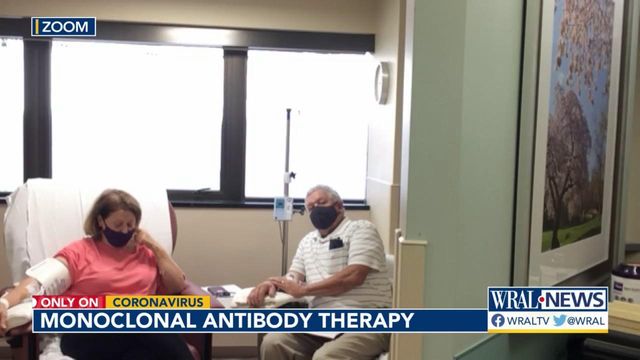Health experts: Monoclonal antibody treatment gaining popularity, helping COVID-19 patients recover faster
Monoclonal Antibody Therapy is gaining popularity in North Carolina -- and hospitals throughout the Triangle are seeing the increase in demand.
Posted — UpdatedMonoclonal antibody therapy is gaining popularity in North Carolina — and hospitals throughout the Triangle are seeing the increase in demand.
In June, about 100 people a week were getting monoclonal antibody therapy across the state, but last week, more than 3,000 treatments were given to patients.
At UNC Rex Hospital, COVID-19 positive patients Marsha and Rick Morgan are hooked up to IVs.
"I am hoping my symptoms will be even lighter and milder than they are," said Marsha Morgan.
The Morgans, who are in their 60s, said they started feeling ill six days ago. Then, they tested positive for the virus. Rick Morgan was vaccinated, while Marsha Morgan was not.
Rick Morgan said he wasn't surprised when he tested positive for the virus because of the rise in breakthrough cases, but assumed his symptoms wouldn't be as harsh since he was vaccinated.
"Actually, my symptoms are about the same as my wife, and they are not that bad right now," said Rick Morgan. "That's why we are doing this. To hopefully curb it so it won't get worse."
"Some folks, it doesn't affect them hardly at all ... they say [it's] like a bad cold. Others, it takes a turn for the worse. I didn't want to be one of those ones where it took a turn for the worse," he added.
UNC Rex clinical manager Margaret House runs the unit where patients must be seen within 10 days of when they started experiencing symptoms.
"The sooner we give it to the patient -- the better for them," she said.
House said 70 percent of patients see significant improvement within 24 to 48 hours.
"It helps to prevent the virus from attaching and replicating in themselves, which helps to stop the viral shed they have where they are transmitting the virus to other patients," said House.
In the last two weeks, House said about 50 percent of her patients receiving the monoclonal antibodies have been fully vaccinated for the virus.
"While they have gotten COVID, their symptoms are a little milder than the patients who are not vaccinated," she said. "There is a significant benefit."
House said patients who have recently tested positive for the virus have more phlegm and congestion than in the beginning of the pandemic.
"It could be in their upper airways, or we have a lot of patients that, it settles down in their chest and could unfortunately lead to COVID pneumonia," she added.
In a press release, Cooper said allowing more peoople to get the monoclonal antibody treatment will make it easier for people with COVID-19 symptoms, especially those with less access to a regular health care provider, to receive "potentially life-saving treatment."
"It's not uncomfortable. I am not feeling any different," described Marsha Morgan.
"It's easy," added Rick Morgan. "If you've ever had blood drawn and they put a needle in your arm -- it's not that different.
Health experts said the one-time treatment is keeping sick people out of hospitals that are already overcrowded with coronavirus patients.
"The sooner we give it to the patient, the better for them," said House.
Unvaccinated people who get monoclonal antibodies have to wait 90 days before getting the vaccine.
Marsha Morgan said she is still undecided about whether or not to get vaccinated.
"I wanted to wait as long as I could to see how it was affecting people over time," she said.
For others who might be hesitant, health care workers said to call your doctor, have a conversation, be informed and get vaccinated.
"It's causing a big strain on our health care system, and we are doing everything we can to help them, but if they can, please help us by getting their vaccinations so we can stop COVID and be able to all go back to what we are used to as the normal and be able to take care of patients that need treatment much quicker then they are right now," said House.
Monoclonal antibody treatment is free through the federal government. However, in some cases, patients might be responsible for an administration fee.
Where to get monoclonal antibody infusion therapy:
- The Pittsboro Therapeutic Infusion Center
- Children's Specialty Clinic
- UNX Rex Healthcare
- Caldwell Infusion Center
- UNC Urgent Care at Clayton
- Lenoir Hospital
- Nash COVID Infusion Unit
- Rockingham COVID Inpatient Unit
- Wayne Infusion Center
- Pardee Hospital
Related Topics
• Credits
Copyright 2024 by Capitol Broadcasting Company. All rights reserved. This material may not be published, broadcast, rewritten or redistributed.






